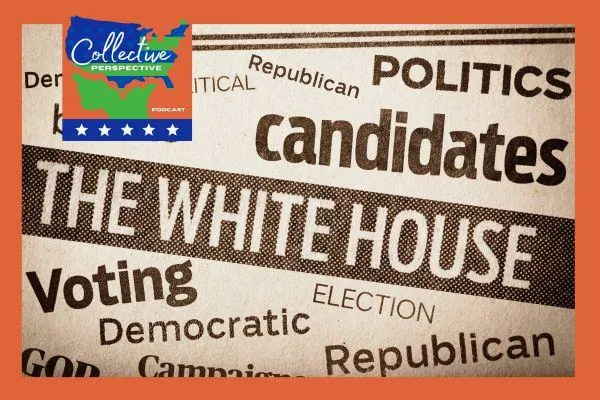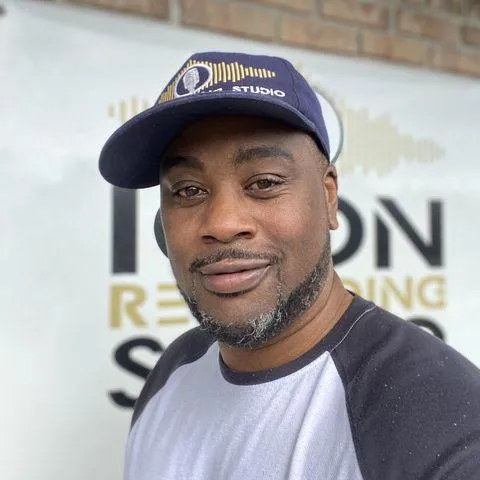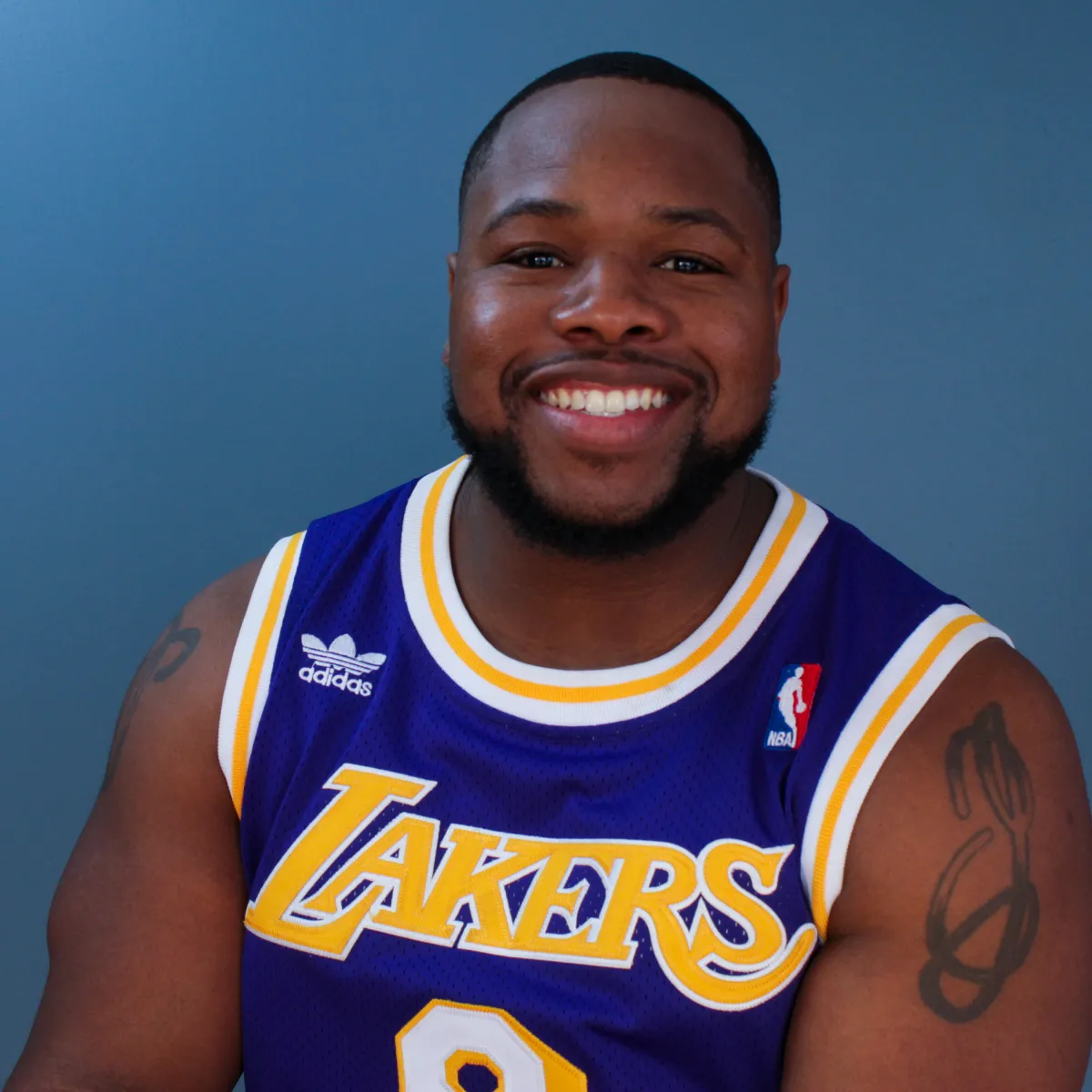The Collective Perspective Podcast
Season Trailers & Clips
ABOUT THIS PODCAST
The Collective Perspective is a podcast for people who want to grow. Grow in how they think, live, serve, and contribute to the world around them.
Hosted by Jeff Aldrich and Travis Eadens, we dive into everyday battles we all face: identity, purpose, burnout, anxiety, faith, unity, character, digital overload, and staying resilient in a divided society.
We explore mindsets and habits that shape our choices. We talk about taking ownership of our attitudes and actions. We focus on becoming better husbands, parents, friends, and neighbors.
We learn to think for ourselves, communicate well, and build stronger communities by starting with the person in the mirror.
Some episodes highlight everyday Americans and the real work they do to make this country stronger. Every conversation is centered on learning from real life and learning from real people. We share both challenges and victories that help us become people others can rely on.
Featuring our Episodes

A Voter's Guide to Selecting a President
Welcome to this special two-part episode of Collective Perspective Podcast
NOTE: The Collective Perspective Podcast hosts would like to thank special guests, Brandy Mackey, and Jamey Brock for their perspectives and friendship. The episodes' notes are provided at the end of this article.
In episode 43, we tackle the 2024 presidential candidates before the debate stage chaos unfolds. Are we witnessing a battle of ideas or just a high-stakes popularity contest? With humor, sharp insights, and a mix of diverse viewpoints, we explore the policies, integrity, and leadership (or lack thereof) behind each candidate.
From the voters’ perspective, are we engaged citizens or just cannon fodder in a political spectacle? Tune in as we cut through the noise, challenge assumptions, and find out if this election is about more than just the drama.
In episode 44, the Collective Perspective team shifts gears from dissecting candidates to tackling a bigger question: Can we, as a nation, find common ground in the 2024 election? With political divisions sharper than ever, we explore what unites us as voters, beyond party lines and campaign promises.
Through honest conversations, we challenge the narrative that every election has to be a battle. Instead, we ask: What would happen if we focused on shared values and real solutions? Listen in as we explore a path toward unity amidst the noise.
How to Pick the Best Candidate for President: A Thoughtful Voter's Guide
Choosing the best candidate for president is one of the most important responsibilities we have as citizens. The president holds immense power to shape the future of the country, influence global affairs, and make decisions that impact everything from the economy to healthcare. With so much at stake, it’s crucial to approach this decision thoughtfully and carefully. But how do you pick the best candidate for president?
In this special 2-part episode series of the Collective Perspective, the hosts and their guests debate the critical qualities and policies needed in a leader and whether we can unite even though we have differing opinions. In light of these conversations and with the presidential election slightly over a month away, we are sharing a guide that uses critical thinking and a detailed approach to help you navigate this vital process.
Understand the Issues That Matter to You
Before you can evaluate candidates, you need to know where you stand on key issues. What policies are most important to you? Is it healthcare, education, climate change, the economy, social justice, foreign policy, or something else?
Start by making a list of your top priorities. Knowing your values will help you focus on candidates who align with your beliefs.
Questions to ask yourself:
What challenges are most pressing for the country?
How do I feel about the current state of issues like healthcare, education, and national security?
Which issues directly affect me, my family, and my community?
Having a clear understanding of your priorities will help you apply the below framework to assess the alignment of candidates and their platforms. We have broken the rest of the guide into two parts:
PART 1 - QUANTITATIVE MEASUREMENTS
Evaluate the candidate's policies and platforms
Examine their track record on major issues
Assess their ability to build alliances
PART 2 - QUALITATIVE MEASUREMENTS
Consider leadership qualities
Assess their vision for the future
Trust your instincts
Part 1 - Quantitative Measurements
Using quantitative measurements as part of your critical assessment of presidential candidates provides an objective way to evaluate their past performance and future potential. Data-driven metrics such as job growth rates, economic performance, healthcare outcomes, and educational improvements under their leadership offer concrete evidence of their effectiveness. For instance, reviewing unemployment statistics during their tenure in office or analyzing the budget surpluses or deficits they managed can help you assess their economic competence.
Additionally, polling data and approval ratings, while not definitive, can offer insight into how well their policies and leadership resonate with broader demographics. By incorporating these quantitative measurements into your evaluation, you can move beyond rhetoric and promises, ensuring your decision is grounded in real results and measurable impact.
Evaluate the Candidate’s Policies and Platforms
Once you know your key issues, it’s time to dig into each candidate’s policies. Research their stance on the topics that matter most to you. Don’t just rely on headlines—read their official campaign platforms, watch debates, and look for interviews where they explain their positions.
Do their policies align with your values? Look at their specific proposals and how they plan to address the issues. For example, if climate change is important to you, does the candidate have a realistic and actionable plan to reduce carbon emissions?
Are their plans realistic? Bold ideas are great, but a good candidate should also present practical steps to achieve their goals. Consider whether the candidate’s policies are achievable and how they intend to fund or implement their proposals.
Remember, it’s not just about promises—it’s about how well they can turn those promises into action.
Examine Their Track Record
Experience matters. One of the best ways to evaluate a candidate’s potential is by looking at their past performance in leadership roles. Have they served in government, business, or community organizations? What have they achieved, and how did they handle challenges in those roles?
Key aspects to examine include:
Past performance in elected office or leadership roles: Have they successfully led large organizations or held public office? What policies have they implemented, and what were the results?
Consistency: Have they stayed true to their values and principles over time, or have they drastically shifted their positions on key issues? A candidate’s consistency can indicate their reliability in office.
Ethical behavior: Have they conducted themselves with integrity? Look for any scandals, ethical issues, or controversies that could indicate how they might behave in the Oval Office.
A candidate’s track record gives insight into how they might handle the presidency and whether they’ve delivered on past promises.
Check Their Ability to Build Alliances
No president can succeed alone. The ability to build alliances and work with others, both domestically and internationally, is crucial. Whether it’s working across the aisle in Congress or fostering diplomatic relationships with other nations, a president needs strong negotiation and collaboration skills.
Ask yourself:
Can they work with people who disagree with them? Bipartisanship is often necessary to pass meaningful legislation. Candidates who have a history of working across party lines demonstrate a willingness to compromise and solve problems.
Do they have a diplomatic mindset? In foreign affairs, a good president must balance strength with diplomacy. They should be able to negotiate complex international deals while maintaining peaceful relationships with other countries.
A president who can build alliances and foster collaboration will be more effective in achieving their goals.
Part 2 - Qualitative Measurements
Qualitative measurements are essential for gaining a deeper understanding of a presidential candidate’s character, leadership style, and ability to connect with diverse communities. These aspects, while harder to quantify, can reveal how a candidate handles complex issues, builds consensus, and responds to challenges.
Qualitative factors like how they communicate their vision, the empathy they show toward different groups, or their ability to inspire trust and confidence play a key role in determining their capacity to lead effectively. Examining their rhetoric in debates, interviews, and speeches, as well as listening to testimonials from those who have worked closely with them, can provide valuable insights into their integrity, emotional intelligence, and consistency. These qualitative factors help ensure that you’re choosing a candidate not just for their policies, but for their ability to lead with integrity and wisdom.
Consider Leadership Qualities
Policy is important, but so is leadership. A president needs to inspire confidence, unite people across divides, and handle crises with calm and decisiveness. Look
for candidates who display strong leadership qualities such as integrity, resilience, empathy, and the ability to communicate effectively. These traits are critical in a leader who will face complex challenges and tough decisions throughout their presidency.
When assessing a candidate’s leadership qualities, ask yourself:
Can they unite people? A good president should be able to bring together a diverse nation and foster collaboration rather than division.
Do they show empathy? The president must understand and connect with the struggles and concerns of everyday people. Look for candidates who actively listen and show compassion for all communities.
How do they handle criticism and adversity? Pay attention to how candidates respond to tough questions, criticism, or setbacks during their campaign. Do they stay calm under pressure or become defensive?
Ultimately, leadership qualities can help a president navigate crises, build consensus, and move the country forward.
Assess Their Vision for the Future
The president you choose should not only address today’s issues but also have a clear vision for the future. Look for candidates who have a forward-thinking approach and ideas that position the country to meet tomorrow’s challenges. Whether it’s through innovation in technology, education reform, or addressing environmental concerns, the president’s vision should align with the country’s long-term goals.
Consider these factors:
Does the candidate have a long-term plan? Short-term fixes are important, but the best leaders think about sustainable solutions that will benefit future generations.
How do they plan to prepare the country for global challenges? The world is rapidly changing, and the president needs to guide the nation through economic shifts, environmental crises, and global competition.
A strong candidate will have a clear and compelling vision of what they want the future to look like—and a concrete plan to achieve it. While this assessment may on the surface appear as though it is concrete, it is recommended to consider the subjectivity of statements made by each candidate about the future in light of the previous steps.
Trust Your Instincts
Finally, trust your instincts. After doing your research and assessing each candidate’s policies, leadership qualities, and track record, take a moment to reflect on who resonates with you the most. Voting is a personal decision, and it’s important to feel confident that the candidate you choose represents your values and vision for the future.
Conclusion
Picking the best candidate for president isn’t about finding someone perfect—it’s about choosing someone who aligns with your priorities, has a solid track record, and demonstrates the leadership needed to guide the country through both challenges and opportunities. By understanding the issues, evaluating their platforms, and considering their ability to lead and inspire, you can make an informed choice that will help shape the future of the nation. In the end, your vote is your voice, and the right candidate can turn that voice into meaningful change.
EPISODE NOTES:
EPISODE 43: The Collective Awakening of Cannon Fodder
Examining the 2024 U.S. Presidential Candidates
In this episode, special guests, Brandy Mackey and Jamie Brock, join the conversation about the upcoming U.S. Presidential election. The discussion covers a range of subjects including the importance of respectful discourse, the generational gap in political discussions, and the backgrounds and policies of the leading candidates. The group debates the merits and drawbacks of candidates Kamala Harris and Donald Trump, while also examining broader political issues such as term limits, corporate influence, and the role of social media in shaping public opinion.
Through engaging and insightful conversation, this episode offers a comprehensive look at the election and its potential impact on America's future. This is part 1 of 2 episodes.
00:00 Introduction and Podcast Overview
00:40 Meet the Guests
00:59 The Importance of Communication
02:23 Discussing the Presidential Candidates
04:46 Personal Appeal vs. Policy Appeal
10:34 Leadership and Integrity in Politics
16:28 Kamala Harris: Background and Policies
26:21 State vs. Federal Authority 26:58 Transactional Politics
27:43 Project 2025 and Agenda 47
31:58 Disinformation vs. Misinformation
38:01 Corporate Influence in Politics
EPISODE 44: It’s Time to Unite, Not Fight
Diverse Perspectives on Leadership and Accountability in Modern Politics
In part two of our special episode, the Collective Perspective team shifts gears from dissecting candidates to tackling a bigger question: Can we, as a nation, find common ground in the 2024 election? With political divisions sharper than ever, we explore what unites us as voters, beyond party lines and campaign promises.
Through honest conversations, we challenge the narrative that every election has to be a battle. Instead, we ask: What would happen if we focused on shared values and real solutions? Listen in as we explore a path toward unity amidst the noise.
This episode tackles various viewpoints on leadership, focusing intensely on Donald Trump’s tenure and character, and debate the moral and ethical standards expected of leaders, the influence of corporations on politics, and the power dynamics in the political landscape. The conversation also covers Trump's business practices, his handling of classified materials, and the events surrounding January 6th. This episode is part 2 of 2.
00:00 Introduction to the New Season
00:33 Controversial Leadership and Public Perception
02:22 Ethics and Accountability in Leadership
05:37 Business Practices and Political Implications
10:47 Spiritual Perspectives on Politics
17:55 Questioning Campaign Fundraising Tactics
18:09 The Trump Bible Controversy
21:54 Debating Trump's Leadership and Team
22:37 Election Spending and Corporate Influence
29:18 The Impact of January 6th
31:14 The Importance of Voting and Term Limits
34:27 Closing Thoughts and Appreciations
Introducing the Hosts

Jeff Aldrich
Jeff is a Navy veteran, a sound engineer and account manager with Guitar Center Pro.

Travis Eadens
Travis is a Navy veteran of the Gulf War. Travis is an experienced traveling nurse.

Jawad Mills (Season 2)
Jawad owns Icon Studios, a music recording studio in Orange Park, FL.

DJ Malone (Season 1)
DJ is an Army veteran and an influencer with 50,000+ followers on Facebook.
Listen Now
Production Credits
Seasons 3-4 of the Collective Perspective Podcast is recorded and produced by Collective Perspective Production Corp, a nonprofit company, in Orange Park, Florida. In these episodes, the podcast reignites the American spirit of unity and brings genuine dialogue to showcase the diverse tapestry of America. Their guests span from battle-hardened veterans and seasoned tradespeople to freshly-minted voters and grassroots champions, exploring the pillars that fortify our nation — faith, family, solidarity, and insight.
Season 2 of the Collective Perspective Podcast was recorded at Icon Studios in Orange Park, Florida.
Season 1 was recorded and produced by Mix Theory Studios, Inc., in downtown Jacksonville, Florida.
In Seasons 1-2, the podcast focuses on unifying communities and providing a gateway to help fund organizations that support victims of sex trafficking — one topic, one episode and one soul at a time. The Collective Perspective podcast is established as a source of truth in a world of misinformation and for people despite vast backgrounds to unify against evil.
The music in this show is excerpted from ‘Sweater Weather’ by J.Dash, a rapper, record producer, and songwriter who grew up in Jacksonville, Florida.

Powered by Mix Theory Studios, Inc., a content design studio and production company located in downtown Jacksonville, Florida.
Contact Us at [email protected]
Navigation
© 2025 Mix Theory Studios - All Rights Reserved.
